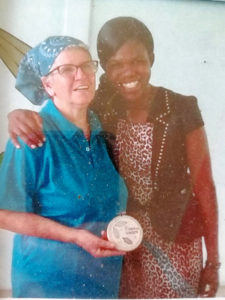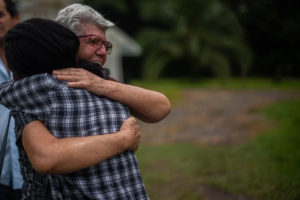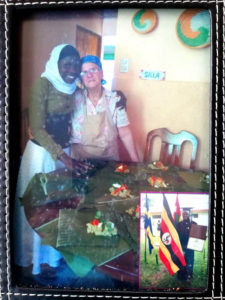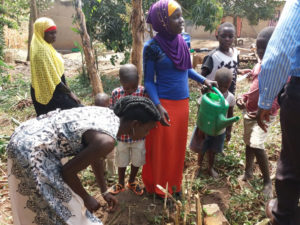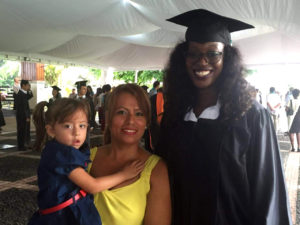EARTH homestays: Bridging changes, enabling adaptation, building family
When Josefa Pereira learns that a new student will soon arrive at her home, she covers the entire place with tags – each spelling out an object’s name in Spanish. Her guests have their roots in either African or Caribbean countries, most have never before ventured away from their birth communities, and their mother tongue is often French, Swahili, Zulu, or Arabic – not Spanish. They come to Costa Rica to study at EARTH University.
But leaving everything behind is never easy. They have to adapt to a new culture and learn a foreign language. Their lives are turning upside down. That is why families like Josefa’s (aka “doña Chepita”) open the doors of their home to students, hoping to guide the adaptation process and create an indelible bond.
Doña Chepita’s tags are everywhere: the note on the refrigerator reads “el refrigerador”, the mirror reads “el espejo”, and so on. She says that her method is effective. She observes the students reading, repeating, and memorizing every word, and – little by little – they begin communicating in a new language. The students she receives travel to Costa Rica five months prior to their first year at EARTH to be part of the Spanish and Intercultural Induction Program, a period of intensive language study and cultural immersion. During this time, they take Spanish classes at EARTH’s Guácimo Campus in Limón and move in with local families in the surrounding communities. Once the academic year kick starts in January, they relocate to the campus to live in the student residences.
Doña Chepita has received students from countries such as Liberia, Somaliland, Uganda, Haiti, and Jamaica. She treats them like sons and daughters and they call her “mamá tica”. She teaches them how to cook Costa Rican food, demands good grades, checks in on them whenever they leave the house, and involves them in both family and neighborhood activities.
“What I like best about the experience is that they are like my children. I love them so much and enjoy helping them with everything. My role is to be like a bridge for them. They alone must keep themselves balanced, but I will help them cross,” says doña Chepita. “I love sharing with them and understanding the sacrifices they make in leaving their families and their countries. They need love to face these new challenges, and I’m here for that.”
Each student who passes through her home is welcomed by the entire family. Fatuma Birungi (’17, Uganda) lived with doña Chepita’s family during her immersion experience in 2013. When she graduated from EARTH in 2017, she packed up her things and began the journey back to Africa. She did not travel alone, though. She was accompanied by Doña Chepita’s daughter Marielos Gutiérrez and son-in-law Leroy Eugene Morrow, who then stayed for a month with Fatuma and her family. The couple spent Christmas and New Year’s Eve getting to know Fatuma’s community. They organized a party for the local children with piñatas and homemade, traditional Costa Rican food. The bond that was forged between the two families is so strong that the Morrow-Gutiérrez family now provides financial support to Fatuma’s younger siblings to continue their studies.
Fernando Gutiérrez, Marielos’s twin brother and 23-year employee at EARTH, also welcomes students into his home with his wife and his family. “What moves me the most about working at EARTH is seeing the students’ parents, proudly wearing their traditional attire and seeing their children receive a degree from an important university,” he says. “It moves me to see the families’ humbleness and the perseverance students show to adapt, study, and achieve their goal. I’m proud to be part of this process and to know that they’re becoming leaders of change for their communities.”
Doña Chepita and her son agree that the most difficult part of the experience is saying goodbye. Sometimes they have lengthy conversations about the future, about upcoming opportunities, about how nervous some students feel about returning home and encountering new challenges. Their respective mamá tica and/or papá tico (tico parent) continues to motivate them, as they did from the beginning. The host families have watched the students succeed at learning a new language in less than six months, demonstrate resilience as they adapted to their new environment, and grow into enlightened leaders prepared and eager to tackle global issues.
According to Fernando, communication with repatriated students remains constant, thanks to social media and digital technology. They make occasional video calls to catch up. They exchange photographs and stories of daily life. They celebrate each other’s successes and share each other’s struggles. Doña Chepita, Fernando, and other families attend graduations and cheer loudly when they hear the name of a student who they´ve hosted. Saying goodbye is hard, but they are grateful for the experience. They remain certain that, because the bridge has been established, the bond will endure.
The University creates spaces and connections based on tolerance, empathy, and respect. In the 30 years since its creation, EARTH has established a flourishing multicultural community, where people of different ethnicities, religions, and cultures live and work together for a better world. Due to the COVID-19 crisis, we are not sure that the experience of the Spanish Program with the communities can occur this year. Still, students will always have the opportunity, in one way or another, to create connections with people and communities that will make them grow as leaders of change.
We are grateful to the families – like doña Chepita’s and Fernando’s – who champion and embody the values and mission of the University.

